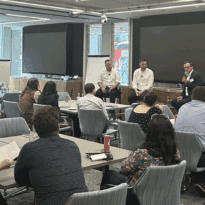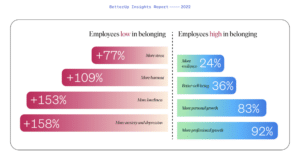The idea of loneliness in the workplace is one that probably doesn’t hit that many radars but it should, says Philip Greenwood, head of Technical Consulting, EQ Investors.
Is the Moon lonely? Has anyone checked on it recently?
It’s well-known but perhaps still surprising that we can only ever see one side of the moon from Earth. Our ever-present companion is hiding a big part of itself.
Slightly less well-known is that the moon is actually trying to get away from us. It is slowly slipping away from the Earth at a current rate of 3.8cm a year. This is not new. In fact, the moon used to be much closer to the Earth than it is now and the effect (due to its gravitational pull affecting the Earth’s rotation) was that our days were actually only around 12 hours long!
Most of us don’t think about this. We may be vaguely aware that we only ever see one side of the moon, and are probably unaware that it is moving away, it’s happening so slowly after all. It is isolated and alone, doing the same thing every day, it’s only had a couple of visitors ever.
Sounds pretty lonely.
It’s no news that loneliness is an increasingly serious issue, with physical and mental repercussions, especially if it is persistent. The NHS confirms that “…if loneliness is very severe or lasts a long time, it might increase the risk of some physical conditions such as dementia and mental health conditions such as stress, anxiety, low mood or depression”. It is a very real problem.
A report by BetterUp in 2022 showed that being better connected at work can give a 36% boost in well-being and contribute to a whopping 92% increase in professional growth. But it also highlights that 43% of people don’t feel connected at work, exacerbating the problems associated with loneliness and missing out on the benefits of connection.
We spend a huge amount of time at work and I’m sure all of us have experienced work bleeding into our personal lives on an emotional level. It can’t help but have a big impact on us.
There is a great article by Tracy Brower (linked below) which highlights ways you can try and help yourself out of a loneliness rut.
But sometimes you may need some help from others. If you are a leader, a manager, or a colleague, it’s important to take notice of your teammates. The BetterUp report shows that managers often feel well-connected, but their team members do not. Like the moon, you may not notice them retreating from you, so you need to be alert to the signs. You may not want to pry too far into personal lives, and that’s understandable, but all humans crave connection (just look at what long-term loneliness can do to us), so try to reach out. According to Tracy, people experiencing loneliness can feel underappreciated, disconnected, and unable to ask for help. Just trying to make a deeper connection with someone may help to bridge that gap and make them feel a bit less lonely. It’s key to put the effort in and create space for connection to happen.
In today’s changed working landscape, it’s important not to assume location is a signifier of loneliness. As the BetterUp report says, “…being remote is isolating, but for some, so is being in person… work arrangement isn’t the obvious predictor of how connected workers feel…”. This is largely because being around people doesn’t necessarily mean that you feel connected to them, and it is connection that drives away loneliness, not proximity. So, wherever your teammates work, you need to make sure you are having interactions that are meaningful and positive.
The graph below from the BetterUp report shows the clear benefits of feeling connected to your colleagues and having a sense of belonging:
Maybe we can’t do anything about the moon, but down here on Earth we can make a difference. Even if you only make one person feel less lonely, I think that’s worth the effort.
https://grow.betterup.com/resources/build-a-culture-of-connection-report
https://www.nhs.uk/every-mind-matters/lifes-challenges/loneliness/
https://www.forbes.com/sites/tracybrower/2024/03/21/how-workplace-loneliness-can-impact-your-job/
https://www.bbc.com/future/article/20230303-how-the-moon-is-making-days-longer-on-earth
































